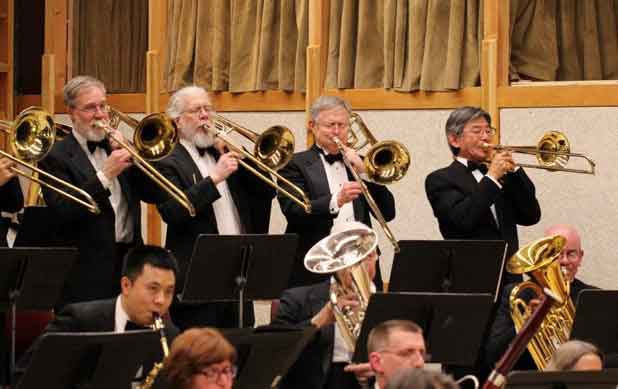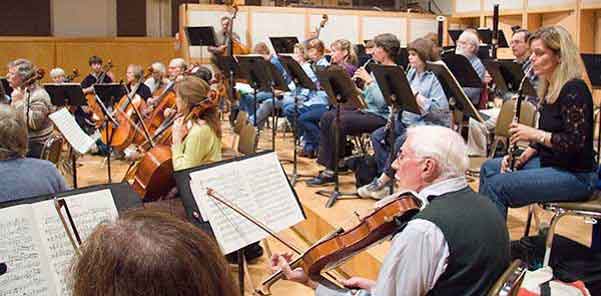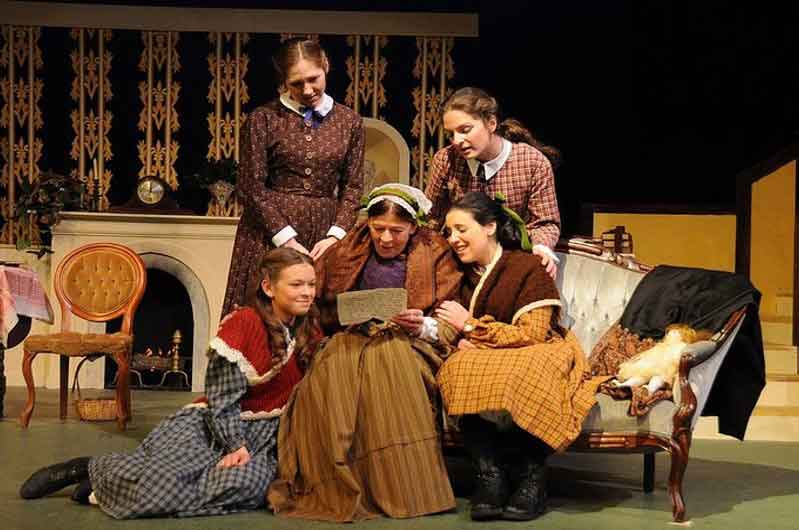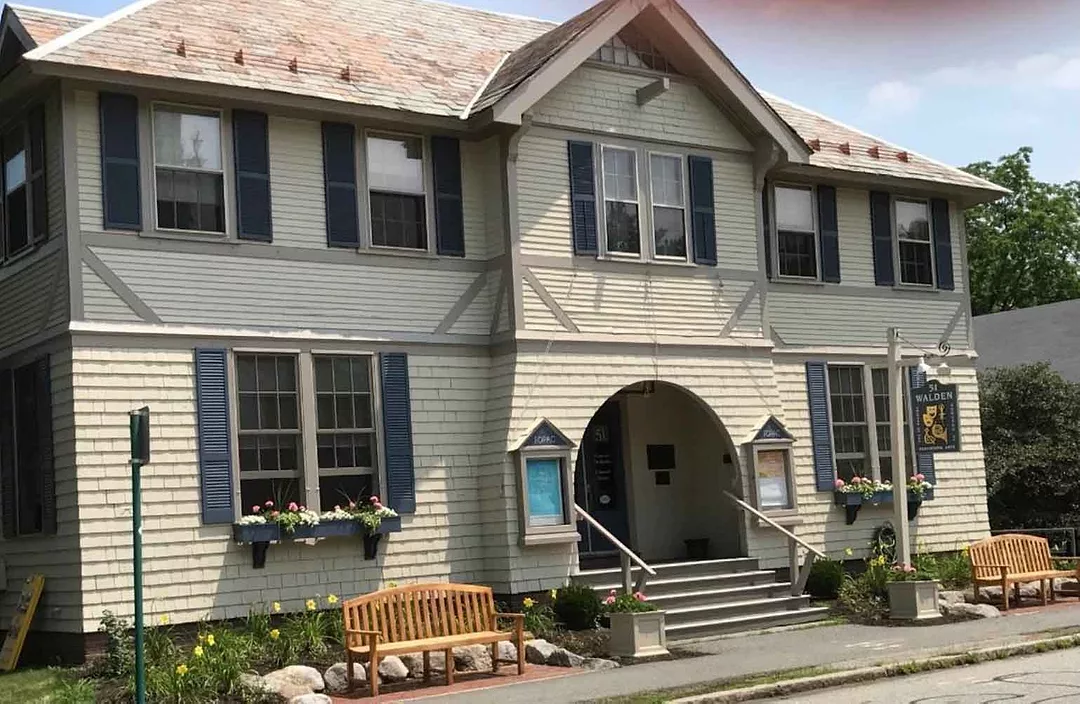It is old and sometimes creaky. Like most of us, it has weathered many storms but is stronger for the wear. And like all of us, it has evolved over a lifetime. One hundred and thirty-five years of history have taken place at its doorstep and within its walls, shaping an identity that is vital to the life of the Town.
In fact, the building at 51 Walden Street is so constant, so enduring, so intimately connected to the lives of the people of Concord, that it sometimes seems a living thing: a grande dame; a cherished elder with wisdom to impart; a friendly neighbor ready to offer a warm welcome. And while we know that a collection of wood and stone, and paint and nails and glass can never speak a word, we also know that from this historic place, many stories have unfolded. We begin.
A Practical Beginning
The Queen Anne style chosen for the building’s design in 1887 by Concord architect John Chapman was a fitting choice for a Town with such a distinguished history. The graceful Romanesque arch offers an elegant welcome to visitors, belying the building’s original purpose as an armory and a drill shed. In 1912, the building was damaged by fire, prompting community members to rally and repair it. By 1920 it was fully operating again, and the Town renamed it the Veterans Building.
From the Ashes
During the building’s early years, the Concord Dramatic Union, founded in 1857 by Louisa May Alcott, continued to mount performances around Concord. By 1921, they had moved their productions to the structure at 51 Walden with their new name, The Concord Dramatic Club. Soon after, in 1922, with the help of eminent Boston architect C.H. Blackall, the Dramatic Club built a stage worthy of Louisa’s prowess as a playwright and performer. It was modeled after the stage of the Colonial Theater in Boston and included a fly tower with a proscenium arch. A raked stage from back to front (state-of-the-art at the time) made it easier for audiences to view performances.
For the next 50 years, 51 Walden would be home to local thespians and would house myriad community activities. The Concord Minutemen and the American Legion had offices in the building. Friendly local canines took training lessons at the site, while Boy Scout meetings and a youth center were also at home inside 51 Walden.
A Near Demise, Another Chance
For 50 years, the sturdy old structure stood steadfast despite the wear and tear from constant use. But in 1958, it was stooped and tired; and loyal service notwithstanding, slated for demolition. Happily, the vote at the Town Meeting was insufficient to tear down those venerable walls. The Concord Dramatic Club (soon to be the Concord Players) continued to stage performances inside the building despite the disrepair, and the youth club continued to meet, all with an optimism that only “show people” and young people can project.
Perhaps it was the energy of those performers’ footfalls, vibrating with life against the boards. Or the echo of Alcott’s hearty spirit which imbued the Town with inspiration. Maybe it is the affection we feel for a place that has housed our shared memories, connecting us to each other. Whatever the reason, 51 Walden survived and by 1972, that wood and stone and paint and nails and glass became animated with the spirit of all who’d passed through its doors and was redeemed.


Trombonists of the Concord Band
Friends of the Performing Arts
The Town of Concord is blessed with a surfeit of artists, writers, philosophers, scientists, and thinkers—people who don’t eschew convention but can embellish it; people who value history and use it to inspire innovation. It was these, the citizens of Concord, who gave 51 Walden its new and lasting purpose.
In 1972, they formed the Friends of the Performing Arts in Concord (FOPAC) and incorporated it as a 501(c)(3) Massachusetts charity. Through FOPAC, they would renovate the building and operate it as a center for the performing arts. The people once again rallied around their grande dame, raising funds to refit the lobby, build a dance studio, and reconfigure the building for its new purpose.

Opera 51 mounts regular, beautifully costumed performances
FOPAC flourished. The Concord Orchestra and the Concord Band joined the Concord Players, giving regular performances and adding to the cultural enrichment of the Town. In 2007, the building was named to the National Historic Register.
Over the years, the resident performing arts groups, with support from the Town and local grantmakers, have made additional improvements to the building; a reinforced performance stage, a music stage, a green room, a wood shop, sound equipment, and all the pedestrian improvements needed to keep a building heated and a roof from leaking.
A Joyous Purpose
The building is now home to three resident performing arts groups, two dance schools, and an opera company. A gallery in the lobby displays the work of local artists. Nearly 500 people come to the building each week for rehearsals and dance classes. This diverse group includes three-year-old ballerinas, ballroom dancers, musicians, and performers of all ages creating art for its own sake. Audiences for performances frequently number 300 or more. The Concord Orchestra, the Concord Band, and the Concord Players stage dozens of shows annually while weddings, holiday celebrations, and even memorial tributes all contribute to the life and spirit of this cherished resource. In 2015, FOPAC became 51 Walden—new name, same mission.
In 2017, the Town rallied again when the old bones of 51 Walden began to rattle. Recognizing that art in all its forms is indispensable to the human experience, the tenants at 51 Walden collaborated in a capital campaign to make 51 Walden accessible to everyone. As they always have, citizens of the Town responded with contributions from $25 to $50,000. Grants from the Cultural Council, the Community Preservation Fund, and the Metrowest Foundation added to the coffers. Now the building boasts a portable lift to provide access to both stages, new and accessible bathrooms, updated exits, and a wheelchair ramp that is up to code. Still to come are a new ventilation system and air conditioning.

The Concord Orchestra in rehearsal

Every 10 years the Players mount a production of Little Women to honor their founder, Louisa May Alcott
Carole Wayland, Concord resident and executive director of 51 Walden, has said that she can think of no more “joyous purpose” than that of 51 Walden. Her observation reflects the remarkable evolution the building has experienced, from its original purpose as an armory to its present celebration of the arts.
Music, dance, drama, and opera are all a part of the ceaseless, collective striving for the ineffable that makes us whole. These and all that is human are embraced within the walls of 51 Walden. Old, yes. Creaky, indeed. But joyous, always joyous.


